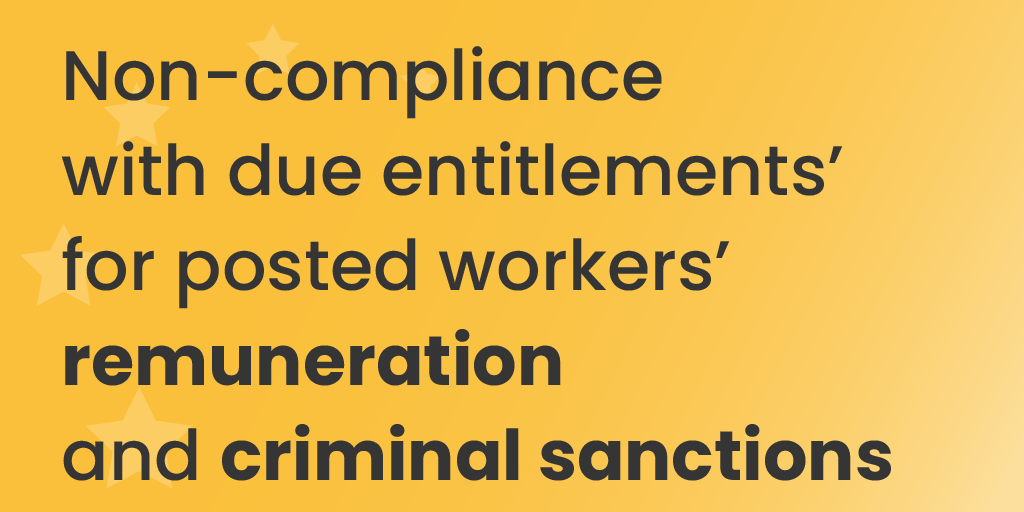
Recently the Belgian Court of Cassation confirmed a ruling in which overall sentences of 12 months imprisonment and EUR 464.000 criminal fines were imposed.
The case is prima facie concerned with posting of workers in the transport sector. It appeared that the genuine situation constitutes employment within the Belgian territory (out of the scope of Directive 96/71/EC).
One of the pleas in law is related to the concept of remuneration, notably the non-payment of the remuneration due in accordance with the applicable collective agreement under the Belgian law.
More specifically, the following questions were answered:
- whether allowances paid in accordance with the law applicable to the employment relationship, in reimbursement of expenditure actually incurred on account of the posting (such as expenditure on travel, board and lodging), and (eventually) not “used” for that purpose, are deemed constitutive elements of the minimum remuneration due in accordance with the collective agreement applicable in Belgium
- the related burden of proof in criminal proceedings
The case at hand is concerned with the Bulgarian “diurna”, a daily allowance intended to cover the costs of meals, transport, and other minor costs specific to the employment abroad, must be borne by the employer, i) paid for each day that the worker stays abroad, to cover the overall higher cost of living, regardless of whether during the same day the individual works or not, and ii) no social security contributions are due on that allowance.
The plaintiffs have not produced any document from which it could appear that in addition to the daily allowance, they would have actually paid expenditure incurred on account of the “posting” for the Bulgarian workers.
In his opinion, AG Bart de Smet recalled the extensive analysis of the concept of daily allowance from the ECJ ruling in C-396/13 (12 February 2015, Sähköalojen ammattiliitto ry /Elektrobudowa Spółka Akcyjna), and the ECJ ruling in C-428/19 (8 July 2021, OL, PM and RO /Rapidsped Fuvaroszáski és Szállitmányozási Zrt).
It must be noted that following previous jurisprudence, the AG analysed the case from the perspective of Directive 96/71/EC as amended by Directive 2018/957/EU (the workers were issued A1 Certificates).
The daily allowance does not constitute remuneration merely because is not paid in compensation for work carried out.
As regards the burden of proof, the AG referred to Art 3.7 Directive 96/71/EC as amended by Directive 2018/957/EU: “Where the terms and conditions of employment applicable to the employment relationship do not determine whether and, if so, which elements of the allowance specific to the posting are paid in reimbursement of expenditure actually incurred on account of the posting or which are part of remuneration, then the entire allowance shall be considered to be paid in reimbursement of expenditure”.
The fact that drivers receive allowances without having to provide any proof of costs actually incurred, does not affect the fact that although mandatory under Bulgarian law, the daily allowance does not constitute a component of the minimum remuneration due in accordance with the relevant applicable collective agreement in Belgium.
The Court of Cassation ruling reversed its previous jurisprudence, and ruled that in such situations (i.e., out of the scope of the Posting of Workers Directive), A1 Certificates issued by the competent foreign authority, do not exclude the obligation to make the Dimona declaration.
It follows that such situations must be addressed under the provisions of Rome I Regulation.
The ruling clearly underlines that:
- by virtue of the Bulgarian law the allowance is intended to cover, inter alia, the costs of meals, transport, and other minor costs specific to the employment abroad
- the allowance is paid for each day that the worker stays abroad, to cover higher living expenses incurred there, irrespective of whether during the same day the individual must work or not
- the reimbursement does not constitute remuneration, because it is not paid in compensation for work carried out
It follows that under both Belgian law and Bulgarian law, the reimbursement of expenses or the ‘diurna‘ constitutes a daily allowance that must be treated in full as reimbursement of costs, and therefore cannot be included in the comparison with the applicable Belgian remuneration.
The proof is in the Bulgarian law, and the mere allegation that the daily allowance was not used (or not entirely used) to cover expenditure incurred on account of the employment abroad, is not sufficient to trigger a burden of proof on behalf of the prosecutor’s office.
The takeaway
In certain Member States, non-compliance with due entitlements for workers’ remuneration, gives rise to criminal sanctions (and that regardless of whether the cross-border situation falls under the scope of the Posting of Workers Directive, or under the scope of Rome I Regulation).
Per diems are not “equivalent” to allowances specific to the posting considered to be part of remuneration (or merely do not constitute components of the minimum remuneration determined by the applicable collective agreement) , unless i) they are not paid in reimbursement of expenditure actually incurred on account of the posting (employment abroad), such as expenditure on travel, board and lodging, and ii) they are paid in compensation for work carried out, in the meaning of the law of the MS in whose territory the work is carried out (where relevant, due regard being given to Articles 8 and 9 Rome I Regulation).
Providing the breakdown: remuneration, allowances (specific to posting), and any arrangements for reimbursing expenditure on travel, board and lodging, other benefits in cash or kind, is now mandatory (i.e., as of 1 August 2022) -see Article 7 Directive 2019/1152/EU read in conjunction (where about posting situations) with Article 9.1 (b) Directive 2014/67/EU, and Article 3.7 third subparagraph Directive 96/71/EC as amended by Directive 2018/957/EU (the so-called letter of assignment). Subsequently, the monthly pay slip, should entail the “factual performance” of the letter of assignment.





